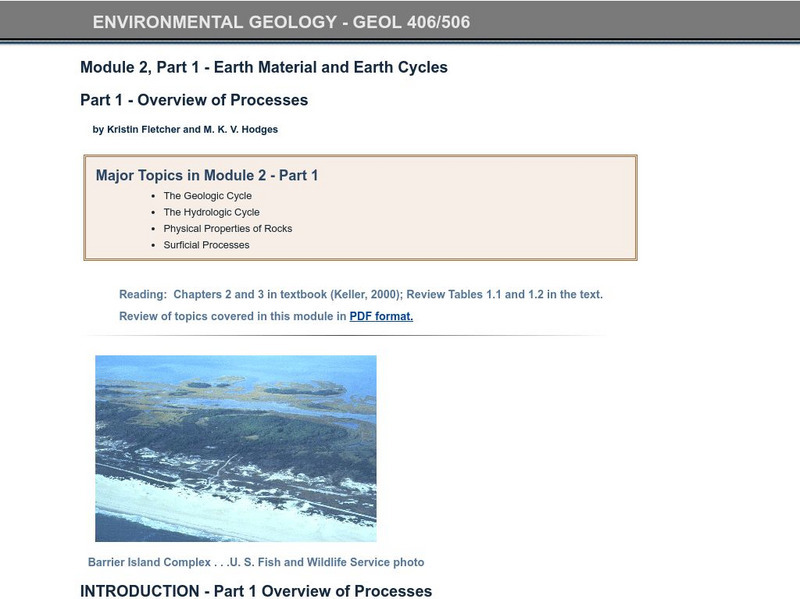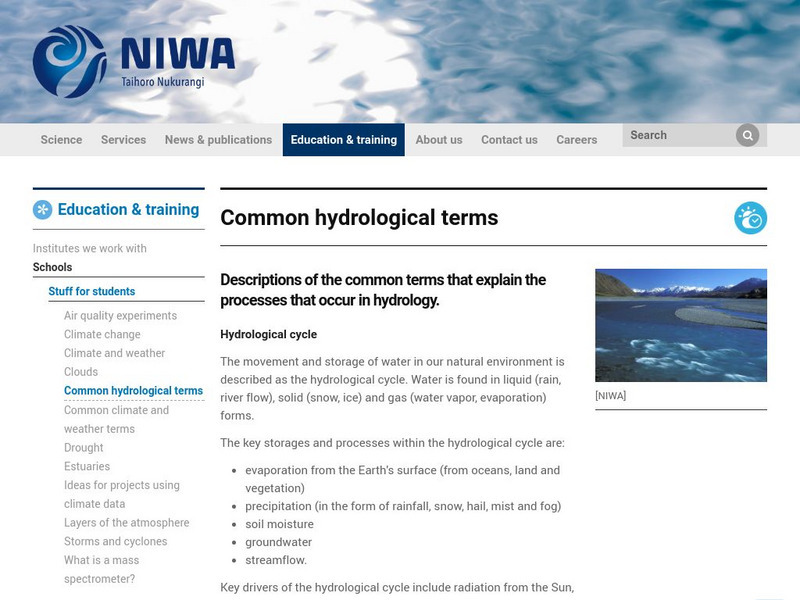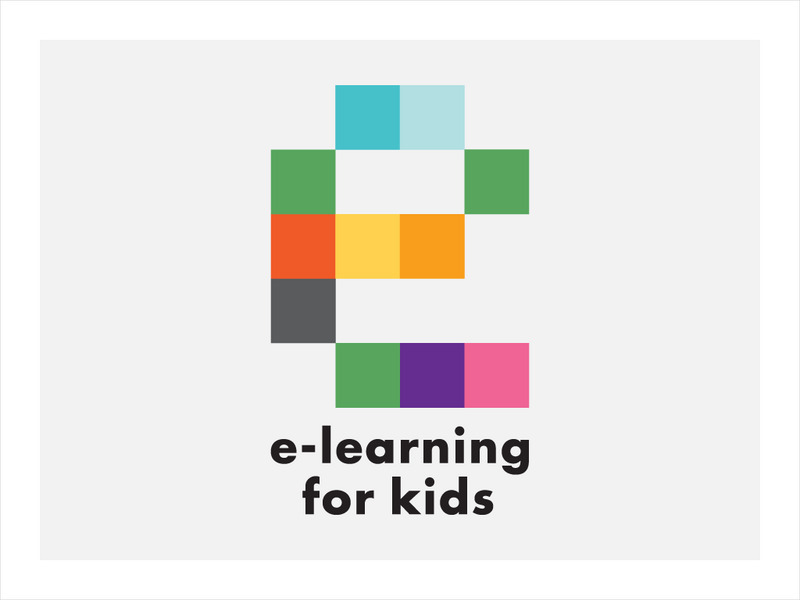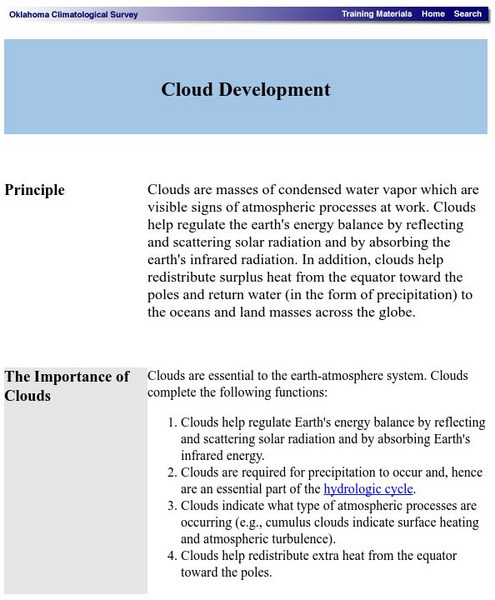Curated OER
Go With the Energy Flow
Students explore energy and nutrient flow. In this science lesson, students diagram the flow of energy through food chains and food webs. Students discuss the importance of energy flow in Earth's ecosystems.
Curated OER
Power, Pollution, Pros and Cons
Students review what they know about non-renewable energy, compare and contrast advantages and drawbacks of each type, such as cost of energy sources, feasibility, air pollution, water pollution, and other risks, and create table listing...
Curated OER
Science: 4 X 4
Pupils generate four statements and four questions based on their current level of understanding of the article from the engage instructional activity. They
evaluate the statements and questions that they have generated and those of...
Curated OER
Junior Engineering Surface Water
Students experience the effects of pollution and erosion on a model of a watershed and explore ways to change the outcome.
Curated OER
The Chemistry of Coal
Students investigate the chemistry of coal. This lesson serves as a review of conservation of mass, simple reactions and equation balancing. During the lesson, students research chemical components of coal, as well as environmental...
Curated OER
Arsenic Globally
Learners, using directed questions, identify five internet resources. They use these resources to identify relevant information by highlighting those sections that address the provided questions. Students present the answers to these...
Curated OER
Campus Nitrogen Budget
Students are given guidelines to college level nitrogen budgeting. Students brainstorm the campus links to nitrogen budget. Students pick topics or subtopics for individual or group research. Students develop research plan, keep good...
University of Illinois
University of Illinois Urbana Champaign: A Summary of the Hydrologic Cycle
Animation and text explain the water--or hydrologic--cycle, which is the process that water undergoes in nature.
Other
The Hydrological Cycle an Human Impact on It. [Pdf]
The hydrological cycle is usually called a recurring consequence of different forms of movement of water and changes of its physical state on a given area of the Earth. The role of different processes in the hydrological cycle and their...
NOAA
Noaa: National Weather Service: Simplified Hydrologic Cycle
The National Weather Service offers information on the processes that make up the water (hydrologic) cycle, including evaporation and transpiration, precipitation, run-off, infiltration, and percolation. Has a good illustration and...
Idaho State University
Idaho State University: Environmental Geology: Earth Material and Earth Cycles
Help students to understand the Geologic Cycle, Hydrologic Cycle, Physical Properties of Rocks and Surficial Processes with this learning module. Find lessons covering each topic.
TeachEngineering
Teach Engineering: Natural and Urban "Stormwater" Water Cycle Models
Students apply their understanding of the natural water cycle and the urban stormwater water cycle, as well as the processes involved in both cycles to hypothesize how the flow of water is affected by altering precipitation.
CK-12 Foundation
Ck 12: Earth Science: Processes of the Water Cycle Study Guide
[Free Registration/Login may be required to access all resource tools.] This study guide summarizes key points about the water cycle. Includes a few questions to check for understanding.
Other
Niwa: Common Hydrological Terms
A glossary of terms that describe the processes that occur in hydrology. Glossary explains evaporation, precipitation, soil moisture, groundwater, and stream flow.
E-learning for Kids
E Learning for Kids: Science: Rio De Janeiro Carnival: What Is Boiling?
Ready for the carnival? First, help Joao get ready for his test about the water cycle, and then explore other water cycle processes.
Science Struck
Science Struck: Water Cycle: An Easy Explanation for Kids
Provides a simple explanation of the water cycle by describing four main stages - evaporation, condensation, precipitation, and collection. Includes three project ideas and some interesting facts.
Indiana University
Indiana Univ.: Global Energy Transfer, Atmosphere and Ocean Circulation, Climate
A course lecture on the external processes that shape the Earth, specifically the hydrologic system. This system is powered by the Sun's energy. The components of the Earth's energy budget are described, and how these drive the movement...
TeachEngineering
Teach Engineering: Go With the Energy Flow
Students learn about energy and nutrient flow in various biosphere climates and environments. They learn about herbivores, carnivores, omnivores, food chains and food webs, seeing the interdependence between producers, consumers and...
Oklahoma Mesonet
Oklahoma Climatological Survey: Cloud Development
This site explores the importance of clouds and how clouds are formed. Content details common atmospheric cooling mechanisms and atmospheric stability.



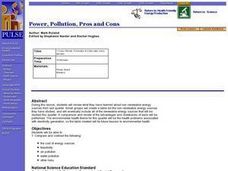





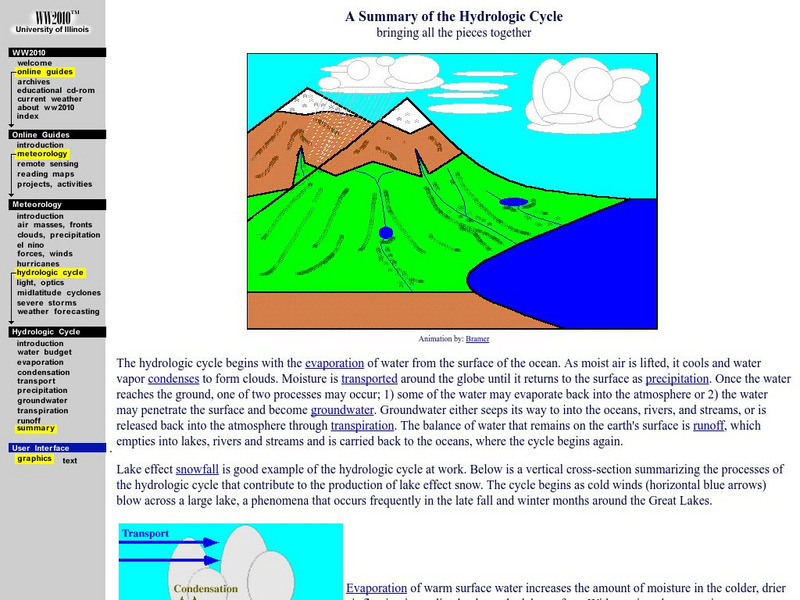
![The Hydrological Cycle an Human Impact on It. [Pdf] Article The Hydrological Cycle an Human Impact on It. [Pdf] Article](https://d15y2dacu3jp90.cloudfront.net/images/attachment_defaults/resource/large/FPO-knovation.png)
